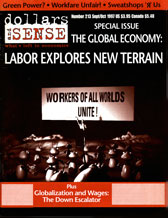Labor Amendment?
This article is from the September/October 1997 issue of Dollars and Sense: The Magazine of Economic Justice available at http://www.dollarsandsense.org
This article is from the September/October 1997 issue of Dollars & Sense magazine.

"If you can find a Democrat or a Republican who supports a constitutional amendment guaranteeing a job and a living wage to every American who wants to work—then, by all means, support that candidate and join that party. If not, then join our party." That was the rap delivered this summer by a Labor Party activist campaining for a 28th amendment to the Constitution—guaranteeing full employment with a minimum wage of $10 per hour.
Labor Party activists hope that the public will soon associate their organization with the goals of full employment and good wages. In the words of Campaign Coordinator Ed Bruno, "If the two words 'Labor Party' come out of your mouth, 'jobs' and 'wages' shouldn't be too far behind." Bruno grants that the party has not worked out the details of accomplishing these goals. Instead, the campaign is designed to establish full employment and the living wage as basic aims of public policy. How to achieve these aims should then be the subject of a national debate.
In the meantime, the Labor Party is using the campaign to help build a grassroots infrastructure. The campaign is being conducted according to the "Labor Party style of grassroots work," which means canvassing door-to-door or in the workplace. The party has not raised the banner of the 28th amendment in order to lobby for public service jobs or another increase in the minimum wage, Bruno emphasizes, but to put the right to a job at a living wage on the national agenda, and to build a mass-based party capable of winning this right.
—Alejandro Reuss
What Women Want
Karen Nussbaum, the director of the AFL-CIO's new Women's Department, points out that although women make up 40% of union membership, the AFL-CIO does not act like the nation's largest working women's organization. To find out what its mandate should be, the department sent out a survey this spring asking its members and others, "What do working women want?"
Statistics published by the AFL-CIO showcase the boons of women's involvement in unions, including a smaller gap between men's and women's salaries. In 1996, women earned 75 cents for every dollar earned by men. But union women earned 84 cents for every dollar earned by union men, and 38% more than their nonunion counterparts.
While wage gaps are narrowed with union involvement, the Women's Department says unions need to do more to represent women as workers—hence the survey. The next step, says feminist economist and unionist Maggie Coleman, is to integrate women from the rank and file into the union's leadership positions. Only 13.2% of the AFL-CIO executive council members are women—an improvement under the Sweeney administration. Whether member unions follow suit in attempting to recruit more women leaders is yet to be seen. Even in unions with vast majorities of women members, such as UNITE, the garment workers' union, leadership is less than 5% female.
Discrimination and unions have not always gone hand in hand. According to Coleman, women were the historical impetus for the first U.S. unions. The organizers of the first recorded mill strikes in Paterson, N.J. and Dover, N.H. were women and children. The Knights of Labor, the first national union, gave membership regardless of race or gender and bargained actively for equal pay for equal work. In fact, the AFL split from the Knights over this inclusive policy.
Now the AFL-CIO seems to be moving in the right direction. On September 5, the "Ask a Working Woman" campaign will reach fruition as an expected 1,000 women gather in Washington, D.C. There the Department will release the results of the survey gauging working women's opinions on issues ranging from flexible work hours and equal pay to child care and retirement benefits. They will also collaborate on a mandate for change to be presented to President Clinton, Congress and the media. To join the "Ask a Working Woman" campaign, call 888-971-9797.
—Cara Patterson
